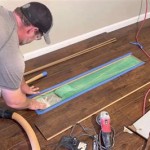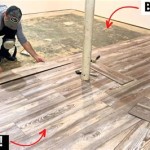Installing Laminate Flooring In A Basement: Essential Aspects To Consider
Laminate flooring is a popular choice for basements due to its durability, affordability, and ease of installation. However, there are some essential aspects to consider when installing laminate flooring in a basement to ensure a successful and long-lasting installation.
1. Moisture Control
Basements are prone to moisture, which can damage laminate flooring. It is crucial to control moisture levels before installing laminate flooring by addressing any sources of moisture, such as leaks or condensation. Install a dehumidifier to regulate humidity levels and consider installing a vapor barrier to prevent moisture from rising through the subfloor.
2. Subfloor Preparation
The subfloor must be flat, smooth, and dry before installing laminate flooring. Remove any existing flooring, level any uneven areas, and repair any damaged areas. A moisture barrier should be installed on top of the subfloor to prevent moisture from reaching the laminate flooring.
3. Underlayment
Underlayment is a thin layer of material placed between the subfloor and the laminate flooring. It provides a moisture barrier, reduces sound transmission, and helps level the floor. Choose an underlayment that is appropriate for basement installations, such as a vapor barrier or soundproof underlayment.
4. Laminate Flooring Selection
Not all laminate flooring is suitable for basements. Choose flooring with a high moisture resistance rating and a wear layer that can withstand heavy foot traffic. Consider a thicker laminate flooring with a thicker wear layer for increased durability.
5. Acclimation
Laminate flooring needs to acclimate to the basement environment before installation. Unpack the flooring boxes and let them sit in the basement for at least 48 hours before installing. This allows the flooring to adjust to the temperature and humidity levels, reducing the risk of buckling or warping.
6. Installation Method
Laminate flooring can be installed using a floating or glue-down method. In a basement, a floating installation is generally recommended as it allows the flooring to expand and contract with changes in temperature and humidity. Follow the manufacturer's instructions carefully when installing the flooring.
7. Transitions and Moldings
Transitions and moldings are used to connect different flooring materials or to cover expansion gaps. In a basement, it is important to use moisture-resistant transitions and moldings. Choose transitions that are designed to accommodate the thickness of the laminate flooring and the underlayment.
8. Maintenance and Care
Once installed, laminate flooring in a basement requires regular maintenance to keep it looking its best. Sweep or vacuum regularly to remove dirt and debris. If spills occur, wipe them up immediately using a damp cloth. Do not use harsh cleaning products or abrasive materials, as they can damage the flooring.
By following these essential aspects, you can successfully install laminate flooring in your basement that will provide years of beauty and durability. Remember to prioritize moisture control, proper subfloor preparation, and choose high-quality materials for a long-lasting installation.

Tips And Tricks For Using Laminate Flooring In The Basement

Our First Diy Project Laminate Flooring In Ben S Basement Office House Of Hepworths

Laminate Flooring On Concrete Basement Floors Expert Installation Guide Csg Renovation

Laminate Flooring In Basement Install A Floating Floor Over Existing Tile The Money Pit

Laminate Flooring On Concrete Basement Floors Expert Installation Guide Csg Renovation

Take These Precautions Before Installing Laminate Flooring In A Concrete Basement

How To Install Laminate Floor In A Basement

Laminate Flooring For Basements

Using Laminate Flooring For The Basement What To Know

Completely Transform Your Basement With Lvp Flooring
See Also







